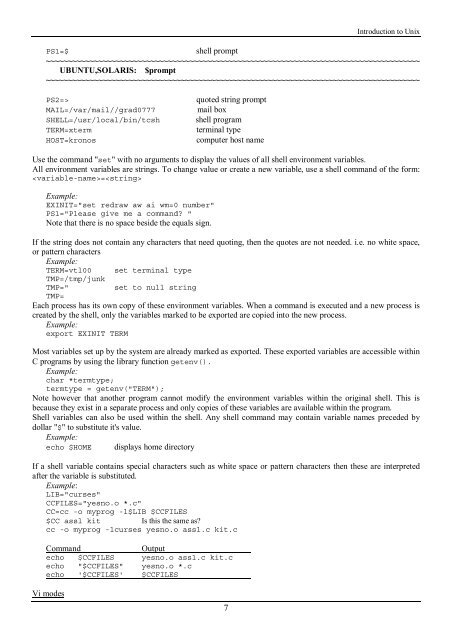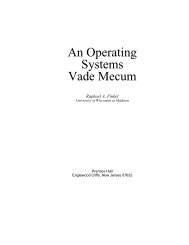Create successful ePaper yourself
Turn your PDF publications into a flip-book with our unique Google optimized e-Paper software.
Introduction to <strong>Unix</strong><br />
PS1=$<br />
shell prompt<br />
~~~~~~~~~~~~~~~~~~~~~~~~~~~~~~~~~~~~~~~~~~~~~~~~~~~~~~~~~~~~~~~~~~~~~~~~~~~~~~~~~~~~~~<br />
UBUNTU,SOLARIS: $prompt<br />
~~~~~~~~~~~~~~~~~~~~~~~~~~~~~~~~~~~~~~~~~~~~~~~~~~~~~~~~~~~~~~~~~~~~~~~~~~~~~~~~~~~~~~<br />
PS2=><br />
MAIL=/var/mail//grad0777<br />
SHELL=/usr/local/bin/tcsh<br />
TERM=xterm<br />
H<strong>OS</strong>T=kronos<br />
quoted string prompt<br />
mail box<br />
shell program<br />
terminal type<br />
computer host name<br />
Use <strong>the</strong> command "set" <strong>with</strong> no arguments to display <strong>the</strong> values of all shell environment variables.<br />
All environment variables are strings. To change value or create a new variable, use a shell command of <strong>the</strong> form:<br />
=<br />
Example:<br />
EXINIT="set redraw aw ai wm=0 number"<br />
PS1="Please give me a command? "<br />
Note that <strong>the</strong>re is no space beside <strong>the</strong> equals sign.<br />
If <strong>the</strong> string does not contain any characters that need quoting, <strong>the</strong>n <strong>the</strong> quotes are not needed. i.e. no white space,<br />
or pattern characters<br />
Example:<br />
TERM=vtl00 set terminal type<br />
TMP=/tmp/junk<br />
TMP="<br />
set to null string<br />
TMP=<br />
Each process has its own copy of <strong>the</strong>se environment variables. When a command is executed and a new process is<br />
created by <strong>the</strong> shell, only <strong>the</strong> variables marked to be exported are copied into <strong>the</strong> new process.<br />
Example:<br />
export EXINIT TERM<br />
Most variables set up by <strong>the</strong> system are already marked as exported. These exported variables are accessible <strong>with</strong>in<br />
C programs by using <strong>the</strong> library function getenv().<br />
Example:<br />
char *termtype;<br />
termtype = getenv("TERM");<br />
Note however that ano<strong>the</strong>r program cannot modify <strong>the</strong> environment variables <strong>with</strong>in <strong>the</strong> original shell. This is<br />
because <strong>the</strong>y exist in a separate process and only copies of <strong>the</strong>se variables are available <strong>with</strong>in <strong>the</strong> program.<br />
Shell variables can also be used <strong>with</strong>in <strong>the</strong> shell. Any shell command may contain variable names preceded by<br />
dollar "$" to substitute it's value.<br />
Example:<br />
echo $HOME displays home directory<br />
If a shell variable contains special characters such as white space or pattern characters <strong>the</strong>n <strong>the</strong>se are interpreted<br />
after <strong>the</strong> variable is substituted.<br />
Example:<br />
LIB="curses"<br />
CCFILES="yesno.o *.c"<br />
CC=cc -o myprog -l$LIB $CCFILES<br />
$CC assl kit<br />
Is this <strong>the</strong> same as?<br />
cc -o myprog -lcurses yesno.o assl.c kit.c<br />
Command<br />
Output<br />
echo $CCFILES yesno.o ass1.c kit.c<br />
echo "$CCFILES" yesno.o *.c<br />
echo '$CCFILES' $CCFILES<br />
Vi modes<br />
7
















